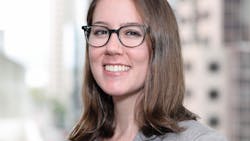2019 40 Under 40: Melissa Ruhl
- One word to describe yourself: Curious
- Alma Mater: San Jose State University
- Favorite book: “Becoming” by Michelle Obama and “Broken Earth Trilogy” by N.K. Jemisin Favorite
- TV show: “Battlestar Galactica”
- Favorite movie: “Ex Machina”
- Favorite hobby(s): urban hiking
- Favorite station or stop that you have ever visited or frequent (and why): San José Diridon, built in 1935, is a classic train station that has remained a center of the community through so much national, regional and local change. When BART and California High-Speed Rail eventually serve Diridon, it will become one of the most important transit stations on the West Coast. In the past, I’ve spent a lot of time there catching trains and buses and every time I return it makes me a bit giddy.
- Favorite route you have ever ridden or frequent (and why): When I used to ride Caltrain to downtown San Francisco, I loved the connecting N Judah light rail ride into downtown. It winds diligently around the Embarcadero, hugging the San Francisco Bay and providing views of the tapering skyline. It was a centering way to transition from the calm of the train into the bustle of the city. Now that I’m lucky enough to walk to work, I sometimes miss that peaceful ride.
Melissa Ruhl is a senior transportation planner for Arup in San Francisco, Calif., where she manages transportation innovation strategies. Partnering with cities and transit agencies, she helps communities plan for tomorrow while improving quality of life today.
In partnership with design firm Perkins + Will, she managed an Arup team that designed a concept for 4th Street in San Francisco based on a future with autonomous vehicles (AVs) in which demand for curbside passenger loading skyrockets. Her work focused on how it’s possible to design livable streets and cities that allow AVs without being dictated by them.
She’s also worked with the city of San Francisco on ConnectSF, a pioneering blue-sky planning effort to develop a 50-year vision for the future of transportation. Ruhl and the team worked with the city on an alternative approach that called for scenario planning to identify key drivers of change, describe potential future scenarios and explore implications for residents. The resulting vision plan is now guiding projects and plans throughout the city.
In June 2018, Ruhl co-authored “Autonomous Vehicles: A Horizon Initiative Perspective Paper” on behalf of the San Francisco Bay Area Metropolitan Transportation Commission (MTC). MTC created Horizon, a regional initiative exploring a range of external forces that have the potential to alter the region’s trajectory. The paper provides an overview of the state of the AV market and presents strategies the region can embrace to create a better world with AVs.
Ruhl frequently speaks in California and nationally on AVs and the future of cities. She’s published several articles and book chapters on the future mobility, including most recently a chapter on mobility as a service in “Disruptive Transport: Driverless Cars, Transport Innovation and the Sustainable City of Tomorrow.”
In June 2018, the Northern California American Planning Association granted her the Special Recognition Award Emerging Planner. In February 2019, she was appointed to the TRB Transportation Issues in Major U.S. Cities Committee.
“Google had announced their Self-Driving Car Project. I became fascinated and eventually completely engrossed in the implications of autonomous vehicles from the potential to save millions of lives globally to the looming threat against struggling transit systems new car technology could present.”
“When I was weighing career options, I was smitten by the fact that planners combined research, thought leadership, and data-driven trends to make tangible improvements in people’s lives. Few professions balance the abstract and the real so fundamentally.”
“Improving transit improves the world. It may sound grandiose, but it’s true. Our progress helps address a long list of challenges including local inequities and global emissions. There’s always more work to be done and more improvements to be planned, which gets me up and downing my coffee every morning.”
